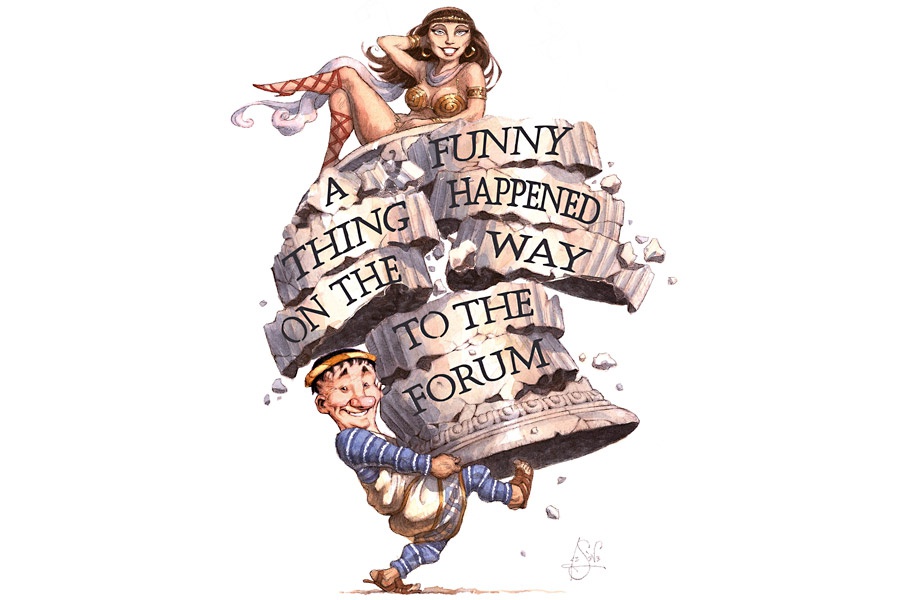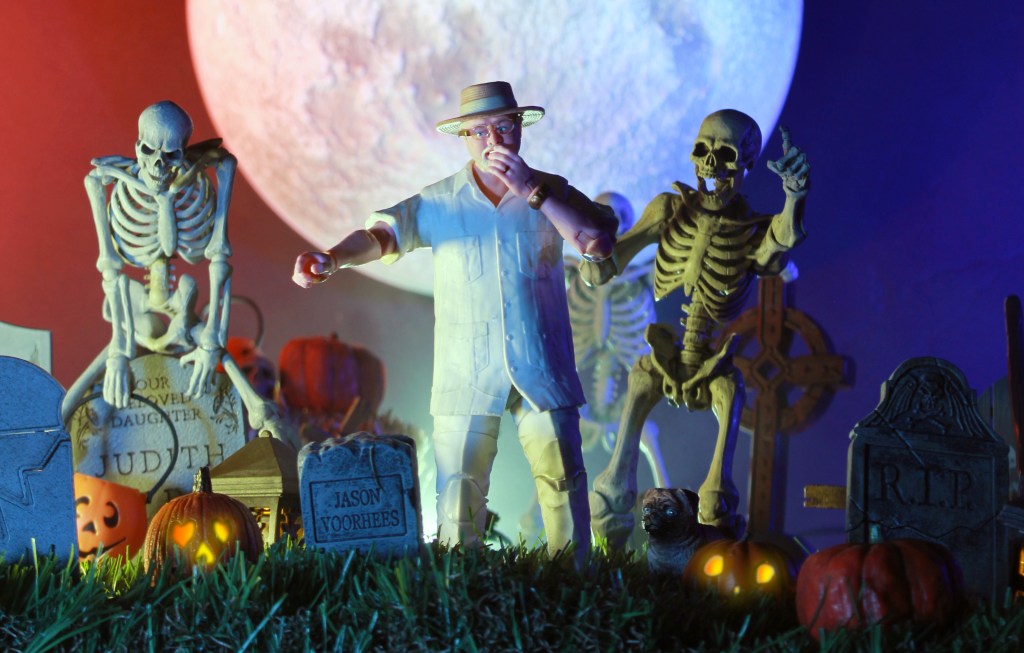Funny Thing Happened on the Way to the Finale

Last Friday night, I went to see A Funny Thing Happened on the Way to the Forum at Bay Street. This is a spirited revival of the old Broadway show, regarded by many as one of the great classics. Its songs by Stephen Sondheim are just fabulous.
This version opened three weeks ago to sensational reviews, particularly in The New York Times, in which reviewer Aileen Jacobson wrote “Marcia Milgrom Dodge, the director and choreographer, has flooded the colorful stage with the high-spirited antics and zany gags that made this show a theatrical treasure in 1962.” Lee Meyer of Dan’s Papers wrote “the usual Bay Street pedigree is on full display in Forum, with a colorful set, lovely and gaudy costumes and a sharp band. Dodge has a clear vision for this show and understands the almost Mel Brooks-like tone it needs to succeed.”
We thought it was not to be missed. Many shows or revivals that start at Bay Street or the John Drew Theater go on to Broadway. Perhaps this would be one.
A large crowd of excited theatregoers chattered away in the lobby before the show. Then came the light flickering to call us to our seats. They flickered twice, then, before anybody could begin to move, everything went dark. What was happening? Next, a few lights came back on.
Five minutes passed. And then someone official got up and said that the big generator that powers all of Long Wharf had failed two weeks earlier and the theatre had been running ever since then on a generator provided by LIPA. Now that was failing, apparently, but LIPA was on its way with a new one. There would be a delay of a half-hour.
And so, during the next half-hour, this lobby became a happy cocktail party. We were all up for anything. We had no idea what would eventually happen. I spoke with Judge Deborah Kooperstein of Southampton, with Hugh King, the Town Crier of East Hampton, with Aaron Daniels of Bridgehampton.
And then the lights came back on, and an announcement was made that the show would go on and we should proceed to our seats. As we lined up to show our tickets, I now saw behind us in the lobby a workman in a yellow helmet with the word LIPA on it. He was smiling and shaking hands with people as he went out the glass door. Outside, I saw him wave and then hop into his truck, at which point all the lights went back out again. But then, in just moments, one after another the lights came back on and we proceeded to our seats.
Several people in this production are people we know. They include Jerry and Adrian Cohen of Shelter Island, who co-produced the play. We know Stewart Lane, the Broadway producer known as “Mr. Broadway,” who in this production plays an old Roman senator with scraggly hair down to his waist who spends much of his time coming on and going offstage to continue climbing the seven hills of Rome, using a modern-day walker.
The stage set is an ancient Roman courtyard with three homes facing out upon it. Two of the homes are owned by wealthy Roman citizens. The third is a brothel. What follows through the first act and part of the second until further problems brought this production to a halt, is this zany farce filled with hilarious songs, acrobatics, mistaken identities, slaves, sailors, lovers, a vicious Roman soldier and some of the wildest looking prostitutes you can imagine.
The plot was easy to follow. Pseudolus, a slave to Senex and his overbearing wife Domina, conspires with Pseudolus’s love-struck virginal son Hero to obtain the object of Hero’s affections, the newly arrived virgin Philia, in exchange for his freedom. He will become a Citizen.
I loved this production. It’s Rome at its looniest. But about three-quarters the way through the first act, one of the performers clapped twice, which was in the script, and all the lights went out. There was then the sound of him clapping twice again, and they came back on, which for just a moment, caught all the actors grinning. Everyone cheered, and the play continued on. The first act reached its climax with our hero the slave lying on a bench, terrified, as the fierce Roman soldier stands over him about to run him through with his sword. “I have one thing to say,” the slave shrieks. “You get one word,” the soldier snarls. The slave yells “Intermission!!”
It was supposed to be a brief intermission, but groups of lights here and there seemed to be going on and off back in the lobby again. Finally we were back in our seats and the band began again. So here we are right where we left off. The slave is still on the bench, the sword of the warrior raised over him. People sing songs and dance. The warrior brings down his sword, but it’s not in time. The slave has leaped up to join in one of the songs. And now the warrior joins in. Thus this comedy thunders gloriously along in a great melee of pratfalls, one-liners, hilarious songs, dance routines.
And then a voice was heard over a loud speaker right in the middle of a conversation between the slave, his master and this fierce Roman soldier who is still threatening. The voice said, “Sorry to interrupt, but we have lost the sound again.” The actors stop speaking and look up and around. “We have no band. The band is out. Actors please leave the stage.”
And once again we were back in semi-darkness. Cellphones came out in the audience. Then a further announcement was made that the show would not continue and the box office would be open for refunds or for a special performance the next day to make up for what was just lost. “And now, actors, come on and take your bows,” the voice said. And so they did, and all of us in the audience stood and applauded them to let them know how we appreciated what they had put together.
As we filed out, I passed the star of the show, actor Peter Scolari (three-time Emmy nominee, in Newhart; Bosom Buddies; Honey, I Shrunk the Kids; The West Wing; ER; Stop the World—I Want to Get Off), onstage, kneeling, signing programs and looking up to talk to well wishers moving past. He was near to crying.
“We’d have loved to hear you all continue on a cappella,” someone said.
“We couldn’t,” Scolari said sadly. “There are cues that come from the band. Please come back and see us tomorrow.”
We left the theatre and walked past men in yellow helmets working furiously alongside two LIPA trucks parked on Bay Street by the back door of the theatre. Their truck engines were running, and the lights on the roof were flashing.
“You didn’t do it,” I yelled in their direction.
Someone in our party said, “I’ve been at productions where the audience has walked out. This is the first time the actors walked out.”
I began humming the best song in the show, sung by two of the wealthy homeowners.
“Everybody ought to have a maid. Everybody ought to have a working girl, a lurking girl, fluttering around the house—flittering in the living room, puttering in the garden, tittering in the Master’s Room, wiggling in the ante room…”
Mostly what I got from this experience was a deep appreciation for the coordination, joy, effort and athleticism of a fine pre-Broadway show such as this, with its long swords aimed at the bright lights of Broadway, 90 miles away. I really appreciated the experience of this hard-fought evening, even though the troupe lost.
It was, as it turned out, “A Funny Thing Happened on the Way to the Finale,” where, at the appropriate time the slave would have been freed, the lovers gotten together and the dastardly their just desserts. But that would be for another day.
It plays until September 1. Go see it.









